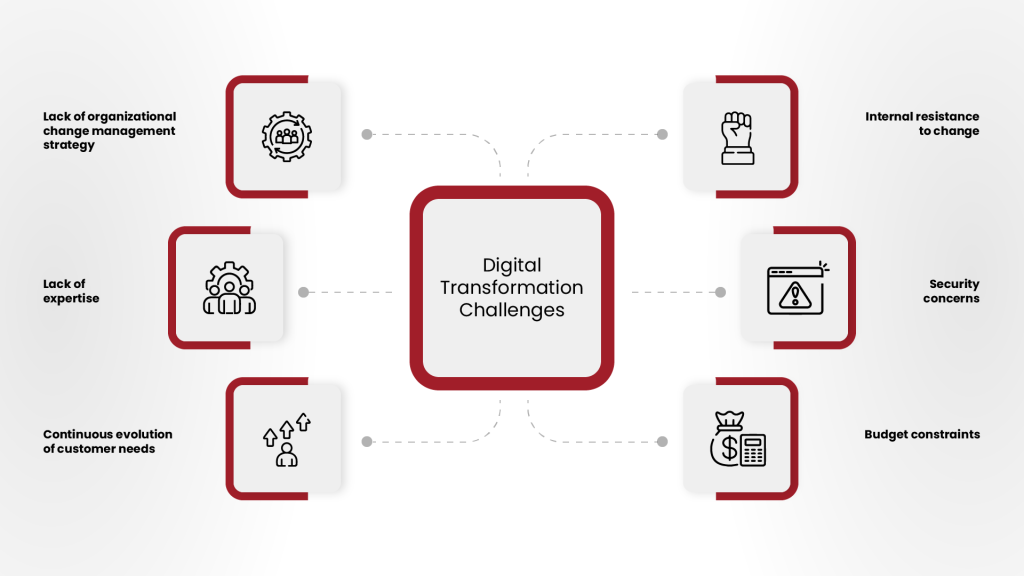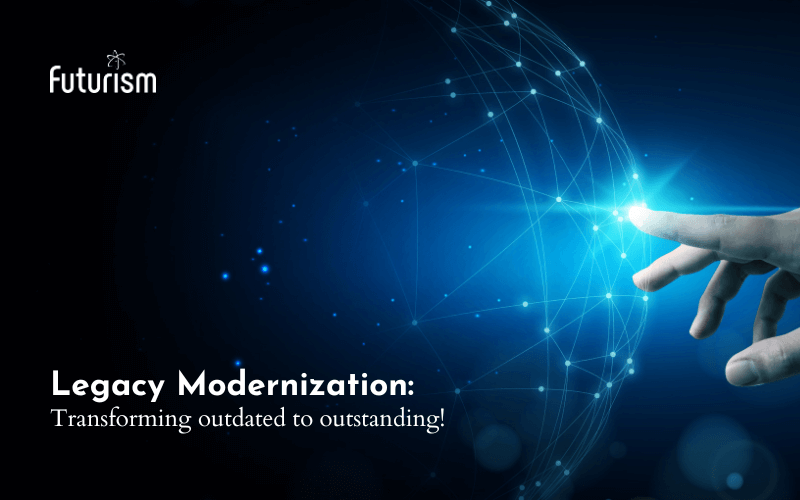The Future is Now: Decoding the Digital Transformation Journey

Futurism Technologies
November 6, 2023 - 4.2K
5 Min Read
Digital transformation (DX) is the revolutionary process by which organizations leverage cutting-edge technologies to reshape their operations, strategies, and customer experiences. In today’s fast-paced and technology-driven world, embracing digital transformation is not merely an option, but a necessity for staying competitive and relevant. It involves the adoption of innovative tools and strategies such as AI, Blockchain, data science, cloud computing, IoT, and automation to optimize processes, enhance decision-making, and offer customers more personalized and seamless experiences. However, despite its numerous advantages, embarking on a digital transformation journey comes with its set of challenges.
In this blog, we will delve into some of the most common obstacles that organizations face during this transformative process and explore effective strategies for overcoming them. Whether you’re just beginning your digital transformation journey or looking to refine your existing strategies, understanding these digital transformation challenges and their solutions will be invaluable for achieving success in this ever-evolving digital landscape.

Read also: 5 Ways to Prepare Your Business for Digital Transformation
Most Common Challenges of Digital Transformation (DX)
Today, the markets are reshaped by forward-thinking companies. There are five common challenges that enterprises face as they begin to explore their digital transformation path.
1. Inadequate IT Resources
Successful Digital Transformation requires more than strategy and planning. A team of IT experts is required to ensure that your company’s digital technologies are set up correctly and securely. According to an enterprise survey, 54% of organizations are unable to achieve their digital transformation goals due to a lack of technically skilled employees.
However, businesses are having increasing difficulty assembling these teams. As more businesses pursue digital transformation, a workforce shortage is emerging, and many businesses are struggling to find the expertise they require in critical areas such as cybersecurity, enterprise architecture, advanced data analytics, and cloud.
Solution: Lack of skilled IT professionals can hinder digital transformation. To address this issue, consider collaborating with external experts and investing in the training of your existing workforce. Leveraging external consultants and upskilling your team can help bridge the skills gap and ensure the success of your digital transformation projects.
Read also: The Ultimate Digital Transformation Checklist – A Futurism Advisory
2. Data Security Concerns
Data security is naturally a top concern when it comes to adopting new technology and processes. It’s understandable for business leaders to be concerned about digital transformation, which typically entails moving an organization’s security solutions to the cloud and moving all data to a centralized location.
Overcoming these potential stumbling blocks, on the other hand, is one of the keys to a successful digital transformation.
Solution: To mitigate risks, engage a trusted managed security services provider who can assess your security needs, implement robust solutions, and ensure ongoing data protection. Staying compliant with data protection regulations is also crucial to maintain trust and integrity during your digital transformation.
3. Inadequate Change Management Strategy
Organizations with a comprehensive change management strategy are six times more likely to meet or exceed their digital transformation goals. Having a strong change management culture is critical for the success of any organization. An effective change management strategy entails planning a project by determining the root causes of problems as well as developing relationships with all stakeholders and employees.
Solution: Begin by identifying the root cause of challenges and creating a comprehensive change management plan. Effective communication, training, and fostering a culture of adaptability and openness to change are key components of a strong change management strategy.
Read also: Why Most Digital Transformation Projects Fail?
4. Legacy System Integration
Legacy enterprise application integration presents a formidable challenge in the digital transformation journey, as organizations face with the need to harmonize decades-old, mission-critical systems with modern, agile technologies. These legacy systems, deeply ingrained in daily operations, often resist easy integration, compelling businesses to navigate a complex path of assessment, middleware utilization, modernization, testing, and continuous monitoring.
Solution: The challenge lies in preserving crucial functionality while ensuring compatibility with the digital landscape, a process that demands meticulous planning and execution to address this challenge and optimize the broader transformation initiative. Careful enterprise application integration of legacy systems, utilization of middleware solutions, and modernization of applications ensure compatibility with the digital landscape.
5. Inferior Digital Transformation Strategy
Why are you shifting from legacy systems and manual processes to new digital ones?
Is there a plan (or a need) in your organization to implement advanced and complex systems? Are you prepared to properly transition your existing systems to new ones?
Solution: A well-defined strategy is crucial for the success of your digital transformation journey. Begin by outlining your objectives and identifying areas for improvement. Implement changes step-by-step, focusing on critical areas first, and gradually expand your digital capabilities to ensure a successful transformation.
Read also: 5 Ways to Prepare Your Business for Digital Transformation
6. Changing Customer Requirements
Digital transformation is a difficult project, with intensive transformation efforts taking years to complete. What if your customers’ needs change during that time? The evolution of customer problems will continue. Don’t be surprised, and prepare to be flexible when it comes to implementing new digital technologies.
Solution: The needs of customers evolve, and your digital transformation efforts should be flexible. Continuously conduct market research to understand changing customer preferences. Building agility into your digital transformation plans will enable you to pivot and adjust strategies as customer requirements change, ensuring your offerings remain relevant and competitive.
Read also: 4 Ways To Win at Digital Transformation on a Shoestring Budget
Takeaway
Digital transformation is the need of the hour. However, it comes with few challenges like IT resource shortages, data security concerns, change management issues, legacy system integration, unclear strategies, and evolving customer needs. Futurism Technologies is a leading digital transformation consulting partner and advisor helping businesses across the world their digital goals in a seamless and cost-iterative manner. We at Futurism understand these challenges and offer comprehensive DX solutions, helping organizations remain competitive and relevant in today’s digital-first and highly-connected era.
Ready to conquer the digital future? Don’t let obstacles hold you back. Join hands with Futurism Technologies and turn challenges into triumphs. Embark on Your DX Journey with Confidence—Partner with Futurism Today!
Subscribe Now!
TRENDING POSTS
-
Futurism Returns to Hannover Messe 2024: Leading the Charge in Industrial and Digital Transformation
-
The Role of Smart Maritime IoT Solutions in Enhancing Maritime Safety
-
Data Integration Unlocked: From Silos to Strategy for Competitive Success
-
Navigating the Shadows: Understanding Zero-Click Attacks in the Digital Age
-
AI Reimagined: Crafting Next-Gen AI Apps with Expert Fine-Tuning
-
Explore Next-Gen Digital Solutions with Futurism at MWC 2024
-
Futurism Unleashes the Technology of Tomorrow at MWC Barcelona 2024
-
Futurism AI: Turning Ideas into Apps at Lightning-Fast Speed
-
Accelerate AI Across Your Enterprise With Futurism AI
-
Futurism to Address the Biggest Security Challenges at RSS 2022
-
Futurism at SelectUSA 2022: Steering the Next Wave of Businesses
-
Futurism to Uplift the MSP Business Community at the MSP Expo 2022
-
Futurism Sets Out to Address the Biggest Security Challenges at the RSA Conference 2022
-
5 Ways to Prepare Your Business for Digital Transformation
-
4 Ways To Win at Digital Transformation on a Shoestring Budget
-
Futurism: Empowering MSPs at the Channel Partners Conference & Expo 2022
-
Why AI in Digital Marketing is the Next Big Thing?
-
Futurism brings ‘Mobile First Digital Transformation’ to the fore at MWC Barcelona 2022
-
Cybersecurity for Rural Hospitals: How can Rural Hospitals become Cyber Smart?
-
Futurism Empowers Rural Health Care Community at the AHA Rural Health Care Leadership Conference
-
The Biggest Problem With Cybersecurity In Healthcare Sector, And How IBM QRadar Can Fix It?
-
How IBM MaaS360 is Revolutionizing Endpoint Security in the Healthcare Industry?
-
Futurism to Present its MSP Partner Program at the Channel Partners Conference & Expo 2021
-
EndPoint Security in Healthcare Matters and IBM MaaS360 Can Help
-
How AI Will Enable Faster Adaptation of Digital Transformation
-
How Is Digital Modernization Important In Supplier On-Boarding?
-
Top 10 Email Marketing Tips for This Holiday Season
-
Benefits of using ERP Software for Energy and Gas Industries





